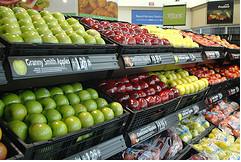
Many of you probably saw the news last week that the Cornucopia Institute had sued Wal-Mart over incorrect labeling of several non-organic products as organic — Lisa Hymas at Gristmill discussed it, as did David at The Good Human. The Washington Post published a concise overview of the conflict:
An activist group representing small farmers has filed a complaint with the U.S. Department of Agriculture, alleging that Wal-Mart Stores Inc. incorrectly labeled several products as organic.
The retailer recently began expanding its assortment of organic foods as part of an effort to attract wealthier, more urban customers. In a statement yesterday, Wal-Mart defended its program and questioned the intentions of the group, called the Cornucopia Institute.
According to the Post, Wal-Mart spokeswoman Karen A. Burk drew attention to the Cornucopia Institute’s connection with Organic Valley, a cooperative of organic farmers that competes with suppliers to Wal-Mart (but does not supply organic products to the retail giant): apparently, one of the Institute’s co-founders, Mark Kastel, had once worked for Organic Valley as a consultant. He apparently refused to say whether the cooperative contributed money to the Institute.
At this point, I wasn’t satisfied with any of this: all I knew for sure was that Cornucopia had lodged the complaint. I checked in with a contact at Edelman, the public relations firm that counts Wal-Mart as one of many high-powered clients, and he sent me the following statement from the company:
Wal-Mart is committed to offering organic food selections that carry the USDA labels which have been certified as such and meet the USDA standards. We’ve discovered that many customers consider it easier to find the organic alternatives they want if they’re mixed with conventional offerings on our shelves. That’s why our customers will find dry grocery, frozen and dairy organic offerings displayed alongside their brand name conventional counterparts.
Organic selections can be found throughout our stores with green signing for customer convenience for easier identification. Although Wal-Mart has more than 2,000 locations that may offer up to 200 organic selections in addition to thousands of non-organic offerings, we believe it to be an isolated incident should a green organic identifying tag be inadvertently placed by or accidentally shift in front of the wrong item. The USDA certification label is featured on the packaging of the organic selections we offer for further customer information and verification.
While I’m always cautious about these kinds of statements, the idea that a mix-up occurred seems reasonable. From the WP article, it sounds like only Stoneyfield Farm yogurt was actually mislabeled. I’ve built a bit of a relationship with the company via its PR reps., so I’m hesitant to pass judgment either way. Others are more willing to do so. So, I ask you: harmless mistake, evidence of deceit, or something in between? I think I can say with certainty that the company knows its critics are watching closely, so a deliberate mislabeling would be pretty brazen. But, it wouldn’t be the first time a major corporation had tried something like this, either. Whaddaya think?
Categories: wal-mart, organic, cornucopiainstitute, complaint, labels

